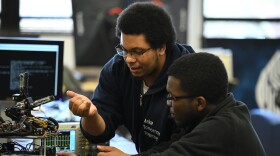Historically Black Colleges and Universities have been in the spotlight the past few years, experiencing a spike in donations and students.
Leoneda Inge, co-host of Due South, is spending the year highlighting HBCUs, their strengths, struggles and resiliency in the series “HBCU 101.”
From Elizabeth City State University in the northeastern part of the state to Johnson C. Smith University in Charlotte, North Carolina has more Historically Black Colleges and Universities than almost any other state. In fact, most HBCUs are in the South — like my alma mater, Florida A&M University.
HBCUs were born during a time when Black Americans were not allowed to attend predominately white schools. FAMU was founded in 1887. But the oldest HBCU in the south is Shaw University, founded in 1865.
Shaw University President Paulette Dillard said her goal is to build a school that’s bigger than just its history.
“Dr. Mary McLeod Bethune said it best. If we can do for our kids what our forbearers were able to do under the circumstances that they endured, we ought to be able to do amazing things going forward," Dillard noted.
And one of the things at the top of Dillard’s list is improving Shaw’s infrastructure and redesigning Shaw’s campus for the future. And that includes rezoning.
“We are located in downtown Raleigh," Dillard pointed out. "So we aren’t able to expand the footprint in land, but we can go up.”
There are 10 accredited HBCUs in North Carolina. The largest historically black university in the country is North Carolina A&T State University. Enrollment at the Greensboro institution is 13,883 students, steadily increasing over the past decade.
Kai White is an 18-year-old senior at Wake Young Women’s Leadership Academy at St. Augustine’s University. She applied to 13 colleges and universities. Ten of them are HBCUs, which includes North Carolina A&T.
“Both my parents went to an HBCU, and now my older sister is currently at an HBCU, and I grew up in a church where a lot of people went to HBCUs. So it always sparked my interest,” White said.

White has been accepted in 12 of the schools she applied to and will likely get into the last school as well. Winston-Salem State University, North Carolina Central University and Howard University are her top choices.
White, who is Black, was also accepted at UNC-Chapel Hill. Last summer, the U.S. Supreme court struck down race-conscious admissions policies at Carolina and Harvard. White’s father, Rev. Harry L. White, Jr. said he was not surprised by the decision.
“I think there’s always backlash where there’s African American progress," he said. "So, it was disappointing but not surprising.”
Shauntae Brown-White, a professor at North Carolina Central University, said they did not discourage their daughter from applying to Carolina or any school. But Brown-White said she knows what Kai would miss if she does not choose an HBCU.
“I think one of the things I appreciate most about attending Howard University is you’re culturally centered," Brown-White said. "And so, you’re not on the margins, you’re not trying to figure out how to fit in. And not to say you don’t have to figure those dynamics out. But it’s not going to be because of race.”
A new book released this month features , including myself. It’s titled “HBCU Made: A Celebration of the Black College Experience,” edited by NPR host Ayesha Rascoe, who grew up in Durham. The Howard University alum credits her college experience with her success. But it was not easy leaving Durham for Washington, D.C.
“Everyone was very nervous about it in my family, but I was determined to go," Rascoe said. "And it was the best decision for me.”
Stay tuned for more “HBCU 101.” Our conversations will include sports, legacy and where Kai White decides to attend college this fall.







